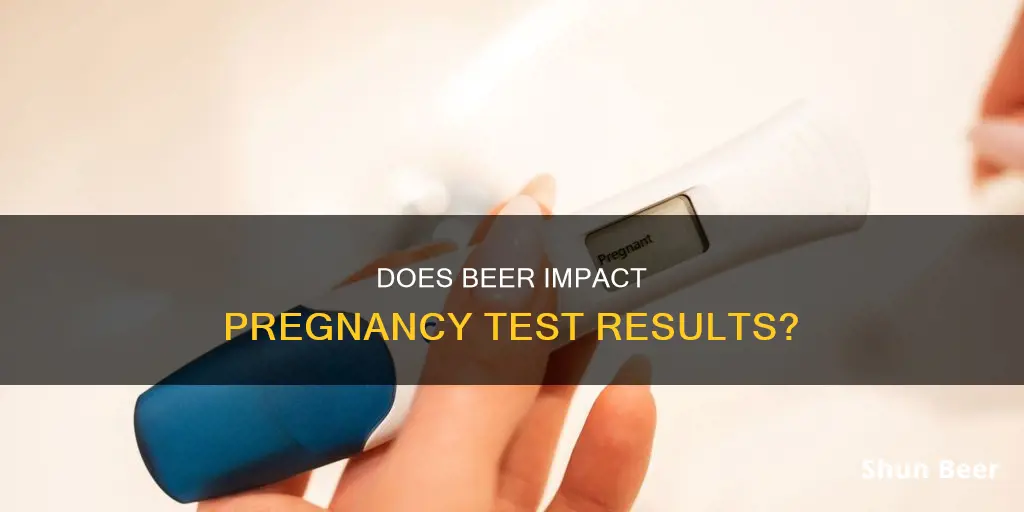
Drinking alcohol does not directly affect the accuracy of a pregnancy test. However, it can have an indirect impact on the test results if your body has only just started producing hCG, the hormone that indicates pregnancy. Alcohol can make you dehydrated, which can lead to increased water consumption, and this dilution of hCG in your urine may cause a false-negative result. It's also important to note that alcohol can impair your ability to take the test correctly, so it's generally recommended to wait until you're sober to take a pregnancy test.
| Characteristics | Values |
|---|---|
| Does drinking 2 beers affect a pregnancy test? | Alcohol does not directly affect the accuracy of a pregnancy test. However, drinking can affect your ability to follow the steps to take it correctly. |
| How does a pregnancy test work? | Over-the-counter home pregnancy tests involve peeing on a stick and waiting for a symbol indicating yes or no. They detect the presence of human chorionic gonadotropin (hCG), the "pregnancy hormone" produced by the placenta after implantation. |
| How does alcohol affect a pregnancy test? | Alcohol can make you dehydrated, which can lead to increased water consumption and dilution of hCG in urine, potentially causing a false-negative result. Alcohol can also impair your judgment and balance, making you less likely to follow directions or collect a quality urine sample. |
| What other factors can impact a pregnancy test? | Overhydration, certain medications (such as fertility treatments with hCG injections), and user error (such as skipping instructions or checking the result too soon) can affect the accuracy of a pregnancy test. |
What You'll Learn
- Alcohol does not directly affect pregnancy test results
- Alcohol can cause dehydration, which may lead to a false-negative result
- Drinking can impair your ability to follow test instructions
- Drinking can affect your balance, making it harder to collect a urine sample
- Alcohol can cause overhydration, which may dilute hCG levels

Alcohol does not directly affect pregnancy test results
It's understandable to be concerned about how drinking alcohol might affect a pregnancy test. Here's what you need to know about why alcohol does not directly affect pregnancy test results.
Pregnancy tests are designed to detect the presence of human chorionic gonadotropin (hCG), often referred to as the "pregnancy hormone." This hormone is produced by the placenta after implantation and can be detected in both blood and urine. The hCG levels typically double every 2 to 3 days during early pregnancy and can be detected as early as 7 to 8 days after ovulation.
Alcohol itself does not directly interfere with the detection of hCG and the result of a pregnancy test. It does not increase or decrease the level of hCG in the blood or urine. Therefore, it will not directly change the outcome of a pregnancy test.
However, it's important to note that alcohol can have an indirect impact on the accuracy of a pregnancy test. If you've been drinking, you may become dehydrated, which can lead to increased water consumption. Overhydration can dilute the concentration of hCG in your urine, making it harder for the test to detect. This could potentially result in a false negative, especially if it's still early in your pregnancy and your hCG levels are not yet high enough.
Additionally, drinking alcohol can impair your ability to follow the instructions for taking the test correctly. It may affect your judgment, making it more likely that you'll deviate from the recommended testing procedure.
To ensure the most accurate results, it's best to wait until you're sober before taking a pregnancy test. Follow the instructions carefully, and consider using the first morning urine, as that's when hCG levels are typically at their highest concentration.
Chugging Beer: How Fast Can You Go?
You may want to see also

Alcohol can cause dehydration, which may lead to a false-negative result
Alcohol is a diuretic, which means it increases the production of urine. This can lead to dehydration, especially if you don't adequately replace the fluids you've lost. Dehydration can affect the accuracy of a pregnancy test because it can cause a dilution of human chorionic gonadotropin (hCG) in the urine. hCG is the hormone that pregnancy tests are designed to detect.
When you're dehydrated, your body tries to hold on to water, and this can lead to a decrease in urine production. If you're taking a pregnancy test, this means that there may not be enough urine to provide a sample for the test. Even if you are able to produce a urine sample when dehydrated, the concentration of hCG may be too low for the test to detect. As a result, you may get a false-negative result, where the test indicates that you're not pregnant even though you actually are.
To avoid dehydration and ensure accurate test results, it's important to stay properly hydrated by drinking enough water throughout the day. This is especially important if you've been drinking alcohol, as it can disrupt your body's fluid balance. It's also a good idea to follow any specific instructions that come with your chosen pregnancy test, as these can help ensure you're getting the most accurate results.
In addition to dehydration, alcohol can also impair your judgment and balance, which may affect your ability to follow the test instructions correctly. If you're drinking alcohol, it's generally recommended to wait until the next day to take a pregnancy test, as this will give your body time to metabolize the alcohol and reduce the risk of any interference with the test results.
Old Beer: Is It Safe to Drink After 30 Years?
You may want to see also

Drinking can impair your ability to follow test instructions
Drinking alcohol can impair your ability to follow the instructions when taking a pregnancy test. While alcohol does not directly affect the results of a pregnancy test, it can have an indirect effect on the accuracy of your test results if you are not careful.
Firstly, it is important to understand how pregnancy tests work. Home pregnancy tests are designed to detect the presence of human chorionic gonadotropin (hCG), also known as the "pregnancy hormone", in your urine. This hormone is produced by the placenta after an egg has been implanted and can usually be detected by a pregnancy test within 12 days of implantation.
Now, here's how drinking alcohol can indirectly affect your test results. Alcohol is a diuretic, which means it can make you feel dehydrated and thirsty. To combat this dehydration, you might drink more water or other fluids. However, consuming excessive fluids can dilute your urine, making it harder for the pregnancy test to detect the hCG hormone. As a result, you might get a false negative result, even if you are actually pregnant.
To avoid this, it is generally recommended that you take a pregnancy test using your first urine of the day, also known as your "first morning urine". This is because hCG is more concentrated in your urine first thing in the morning. If you have already missed your period, you can take the test at any time of the day as your hCG levels will be high enough to give a positive result.
Additionally, drinking alcohol can also impair your ability to follow the test instructions correctly. If you are intoxicated, you might not be able to follow the instructions properly, which could lead to an inaccurate result. For example, you might not collect enough urine on the testing stick, or you might check the results too soon.
Therefore, it is generally advisable to wait until you are sober before taking a pregnancy test. This will ensure that you can follow the instructions correctly and get the most accurate results.
Beer and Colds: Is It Safe to Drink?
You may want to see also

Drinking can affect your balance, making it harder to collect a urine sample
Drinking alcohol can affect your balance, making it harder to collect a urine sample for a pregnancy test. This is one of the ways that drinking can indirectly affect the accuracy of a pregnancy test. Alcohol can impair your balance, making it more difficult to collect a urine sample. This is especially important if you are taking a urine test at home, as you will need to be able to balance to collect the sample and dip the test strip correctly.
In addition to affecting your balance, alcohol can also cause dehydration, which can lead to increased water consumption. This can dilute the concentration of the hCG hormone in your urine, making it harder for the pregnancy test to detect. This is another way that drinking can indirectly affect the accuracy of a pregnancy test, especially if you are in the early stages of pregnancy and your hCG levels are not yet very high.
To ensure the most accurate results, it is recommended to take a pregnancy test first thing in the morning, when your hCG levels are at their highest concentration. It is also important to follow the instructions carefully and wait the correct amount of time before reading the results. If you have been drinking alcohol, it may be best to wait until the next morning to take the test, when you are more likely to be able to collect a sample accurately and follow the instructions correctly.
Beer and Sore Throats: Relief or Risk?
You may want to see also

Alcohol can cause overhydration, which may dilute hCG levels
Alcohol does not directly affect the accuracy of a pregnancy test. However, alcohol can cause overhydration, which may dilute hCG levels and cause a false-negative result.
Drinking alcohol can lead to dehydration, which may cause you to consume more water or other liquids. This increase in fluid intake can dilute the concentration of hCG in your urine, making it harder for a pregnancy test to detect. This is especially true if you are in the early stages of pregnancy, when hCG levels are lower. To get an accurate result, it is recommended to take a pregnancy test using your first-morning urine, when hCG levels are at their highest.
In addition to the potential for overhydration, alcohol can also impair your judgment and balance, making it more difficult to follow the directions for taking a pregnancy test correctly. This could result in user errors that affect the accuracy of the test.
While alcohol can indirectly affect the accuracy of a pregnancy test, it is important to note that the alcohol itself does not interfere with the test result. The impact of alcohol is related to the dilution of hCG levels in your urine, not a direct effect on the hCG hormone.
Beer and Metro North: What's Allowed?
You may want to see also
Frequently asked questions
Drinking alcohol does not directly affect the results of a pregnancy test. However, it can lead to dehydration, which may then cause you to drink more water and dilute the hCG in your urine, possibly resulting in a false negative.
hCG stands for human chorionic gonadotropin, also known as the "pregnancy hormone". It is produced by the placenta after implantation and can be detected in the blood and urine.
There is no known "safe" amount of alcohol use during pregnancy. Even small amounts of alcohol early in pregnancy may be risky, and drinking any amount of alcohol during pregnancy can be harmful to the baby.
Drinking alcohol during pregnancy can lead to fetal alcohol syndrome, which includes symptoms such as behavioural and attention problems, changes in facial structure, poor growth, cognitive difficulties, and problems with movement and balance. These problems can range from mild to severe and may last a lifetime.







